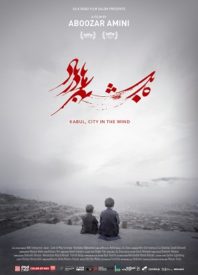
Following the day-to-day life in Afghanistan, director Aboozar Amini chooses two story lines taking place within Kabul. The first is about Abas, who tackles the economics of being a bus driver, and the second is about a family of boys, Afshin and Benjamin, who have to raise themselves after their policeman father goes into hiding. The talking heads with these subjects are eye opening, specifically with the boys. I don’t remember being a boy hand having dreams about guns. So listening to Benjamin talking about his dreams with guns speaks volumes. This documentary shows the violent realities of one of the most dangerous cities today.
Amini also shows the contrasts between simply following his subjects’ daily lives and having conversations with them. We watch the boys play, throwing rocks from a hilltop, the eldest coaching one of his brothers to hit the enemies. Afshin, however, takes his time when Amini asks him about his biggest fears. He eventually finds an answer, being afraid of the suicide bombings that seem like a part of his regular life. So regular that his father got an injury from one. Abas driver has a direct answer – he’s afraid of himself, of a morass that could eat him and his family.
The only thing about these day-to-day documentaries is that we can sometimes feel the movie drag. It follows Afshin down some steps, or the streets where Abas is only driving his bus half the time. There’s also some questionable depiction of Abas’ addiction to a substance that he smokes. But despite this, Kabul, City in the Wind packs a lot of information. Unlike most of us who shrug at the thought of Afghanistan, the film reminds us of these real humans.
For more information on Kabul, City in the Wind, go to https://workmanarts.com/rwm-events/kabul-city-in-the-wind/.
- Release Date: 10/18/201

